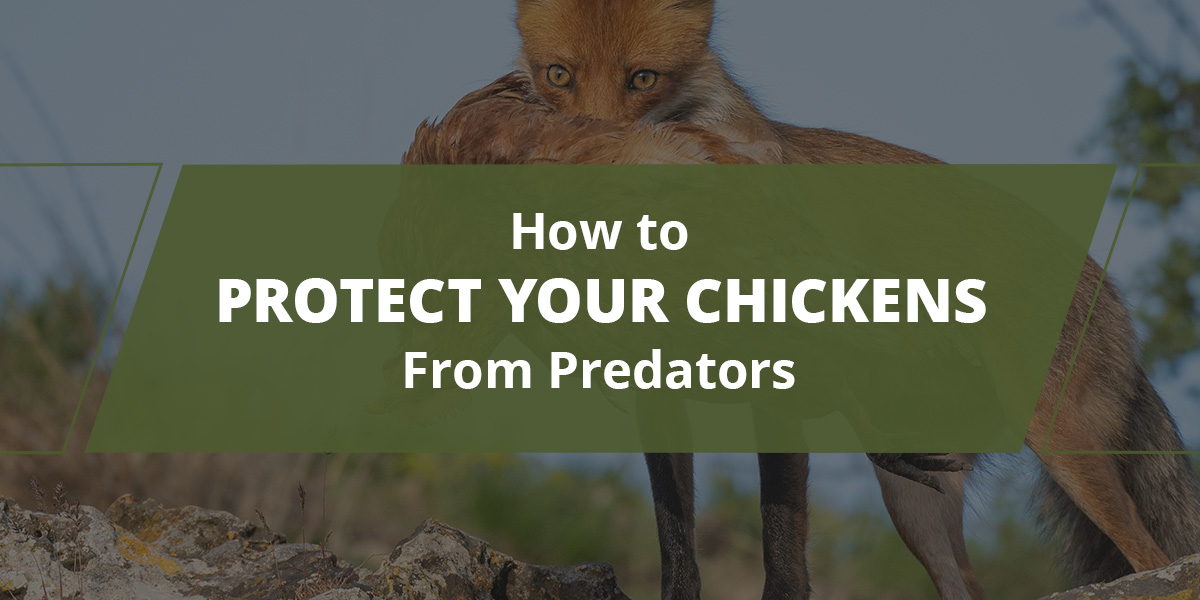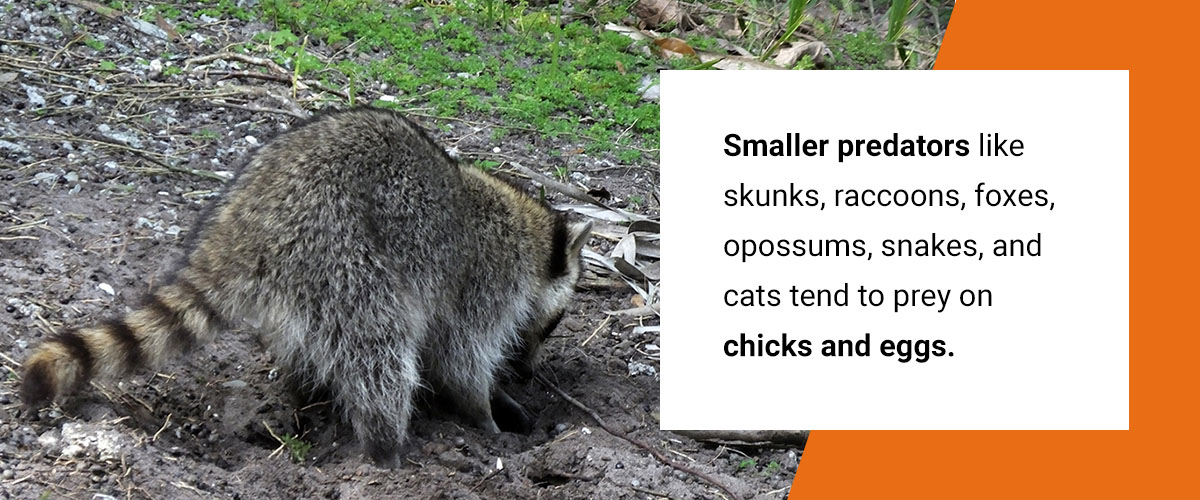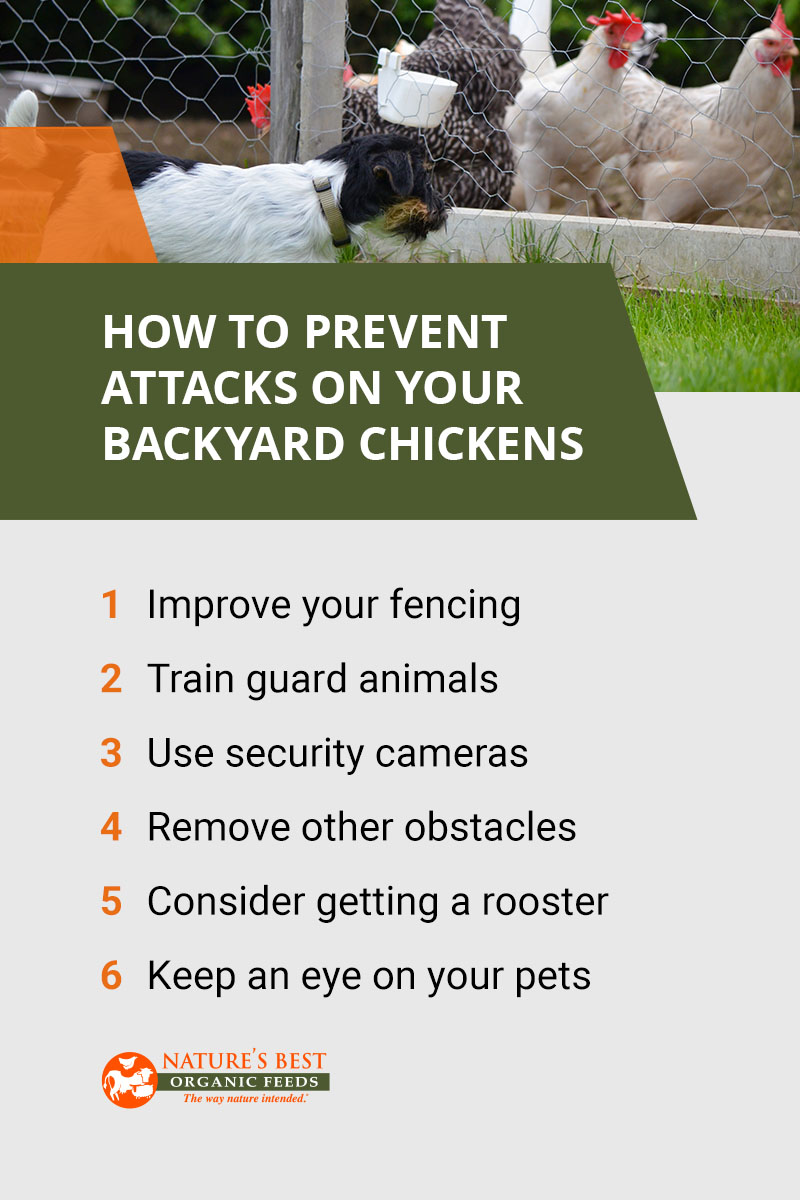
How to Protect Your Chickens From Predators
When you have backyard chickens, running into wildlife is inevitable. Chickens face predators as large as bobcats and coyotes and as small as weasels that go after their eggs. It’s always an unfortunate surprise when you wake up to find that your chickens have been attacked or discover feathers scattered across your coop or yard.
Thankfully, keeping your chickens safe in the backyard is easy and manageable if you have the right tools and dedicate the proper resources to doing so. Identifying the predators threatening your chickens can help you determine what steps to take to protect them.
What Animals Eat Backyard Chickens?
There are several benefits of raising chickens, and many people enjoy their eggs and meat. However, other animals also love the taste of chicken and eggs, meaning poultry faces a large number of predators. Even domestic pets such as your dog and cat can be behind the loss of your flock. Due to their size and limited flight range, it’s easy for larger or quicker animals to catch up to chickens quickly.
Animals that attack backyard chickens include:
- Foxes
- Coyotes
- Wolves
- Birds of prey
- Skunks
- Snakes
- Rodents
- Weasels
- Bobcats
- Raccoons
- Opossums
Backyard chicken predators tend to exhibit patterns that can help you identify what animal is attacking your flock. Predators such as hawks, dogs, bobcats, owls, and coyotes tend to leave little behind after an attack. Scattered feathers, dead adult chickens, or missing birds are indications that one of these larger animals has sprung. Many of these predators operate at night, except hawks, which attack during the day, and bobcats, which can strike at any time.
Smaller predators like skunks, raccoons, foxes, opossums, snakes, and cats tend to prey on chicks and eggs. These attacks are prevalent at night, and you may find scattered egg shells after the visit of a crow, fox, opossum, skunk, or blue jay. Damaged eggs may be from blue jays, snakes, skunks, foxes, or raccoons.
When raccoons attack chickens, they typically go for limbs or heads. If you protect your chickens with mesh wiring, raccoons can still reach through and grab their legs. Raccoons and birds of prey will also scare chickens, causing them to take flight. Once they’re in the air, these predators will grab their heads and take off with them.

Chicken Predators Across the United States
Many states in the U.S. experience the same chicken predators, but there may be a more significant presence of one animal than another based on the region you live in. Knowing which predators are the most common in your area will help you determine the necessary precautions to protect your livestock.
Some animals are found throughout the U.S., including skunks, snakes, raccoons, and coyotes. Birds of prey are also all over the country, though some may be more prominent than others. Various flying predators will always be a threat to your backyard chickens, and whether you need to protect your chickens from jays, hawks, crows, or owls, you can expect flying predators.
Red foxes are also common nationwide, although some places in the Southwest see much fewer numbers. Bobcats are another common predator found in most areas except some parts of the East and Midwest. The Northeast sees more weasels than other regions, and the South and Midwest see more opossums, though they also have a presence on the East and West Coasts.
How Chickens Protect Themselves
Because chickens are heavy birds, they have a minimal flight range. When they face predators, they can only move a few yards at a time, but chickens can protect themselves from some attacks. These birds can use their sharp claws to strike and injure other animals. Plus, their toes are flexible and strong, and they can use their range of motion to their advantage.
While chickens can sometimes hold their own against small predators, it’s still crucial to protect them as much as possible.
How to Prevent Attacks on Your Backyard Chickens
Small farmers and hobbyists who care for backyard chickens sometimes contain them in facilities that may not offer the best form of protection from predators. Whether you prefer to keep your chickens in a coop or let them roam freely, make sure to use the proper security methods to keep them protected from predators.
1. Improve Your Fencing
Investing in shelters to keep chickens safe is one of the quickest ways to protect them from predators. Consider an electric fence to give your chicken more range. These protective barriers will shock potential predators and help keep them away from your livestock. You should always be sure that the voltage is high enough to stun an animal without killing it because there’s always a chance that your chickens will venture to the fence, as well. A dead predator may also bring another to your fence.
To combat birds of prey, you should consider removing some of the obstacles in the space and eliminating any perch sites, such as stand-alone trees or other perching surfaces. Anything within 100 yards of your chickens could become a landing site for hawks, owls, or crows. You can also combat these predators by housing your chickens at night. If you feed and water your poultry at dusk, you can train them to gather indoors during prime predator hours.
If you opt to house your flock at night or keep them enclosed in a secure coop, you must ensure all of your chickens stay healthy. If you notice one is sick or dying, you should remove it immediately. The smell could draw predators, or it could pass a disease to the rest of your chickens and cause as much damage to your flock as a predator.
You’ll also want to ensure you have flooring or another form of ground protection. You can prevent fox attacks on your chickens by keeping a barrier very low to or in the ground, so they can’t dig under your fence and get to your chickens.

2. Train Guard Animals
Guard dogs offer an excellent way to protect your chickens while letting them roam freely. They’ll deter predators and keep your chickens safe. For this method to work, you must adequately train the dog to guard your flock during the day and night, and it must stay with your poultry at all times.
Some dogs are better suited to be guard animals than others. Breeds such as retrievers, German shepherds, and springer spaniels exhibit the right temperament and characteristics for guarding livestock. Training must start when the dog is a puppy so you can do so properly.
Regular contact with your chickens will also be vital to the training process. When your dog interacts with your poultry, they’ll see them as family members needing protection rather than additional animals to scare off or eat.
Another common guard animal to protect chickens is geese. These birds are great for protection because you don’t have to train them. You can raise them with your chickens, so your birds view each other as members of the same flock.
Geese are great at spotting avian predators and can help prevent hawk attacks on your chickens. Even if predators are too large for a goose to fight, they’ll make enough noise to draw your attention.
3. Use Security Cameras
Security cameras alone may not prevent animals from attacking your flock, but they can help you identify your next steps. Knowing which animals are stalking your poultry and seeing how frequently they visit can give you an idea about how to handle the situation. You can also discover how predators are getting through your fences or coop.
If you catch a fox burrowing into the ground or spy an owl stalking them from a tree, you can identify where you need to dedicate your efforts. Consider fortifying your chicken coop or using an electric fence alongside your security cameras rather than using them as a protective measure on their own.
You can also pair your cameras with lights or timed noises. Motion sensor lights scare some animals away, including nocturnal predators such as foxes and owls, who prefer to stay away from lights. Still, note that lights won’t deter predators from roaming other areas of your property. Additionally, lights and noises can disturb closeby neighbors.
4. Remove Other Obstacles
Many animals will continue coming back to your property if they know they find food sources there. Animals that first show up to scour through garbage or dig in your garden may not attack your chickens initially, but if they keep coming back and notice a corral of poultry, they may make your livestock their next meal.
Removing animal hideouts will also help keep your flock safe. Piles of wood, shrubbery, and tall grass give other animals places to wait and hide before attacking. If you move your coop to another location away from these obstacles, predators will have to cross more ground to get to your poultry and a lack of hiding spots will slow them down.
You can combat predators by setting traps or hunting recurring and nearby animals. Keep in mind that you won’t be able to kill every predator. Owls and hawks, for instance, are federally protected. However, you can still combat many other predators by reducing their presence on or around your property. In some cases, working with your town’s animal control organization can help you responsibly remove and deter predators.
5. Consider Getting a Rooster
Your flock can benefit from keeping a rooster nearby because roosters will want to keep them safe from predators so they can reproduce with them. If a rooster spots a predator, it’ll make a loud noise alerting you and the chickens of danger. Then, your rooster will gather your poultry in a safe place and defend the coop.
You can prevent coyote attacks and discourage other large predators from damaging your flock by investing in a loud, protective bird that will watch intently for danger. That said, keep in mind that some neighborhoods do not permit homeowners to have roosters. Be sure to follow your local guidelines so you know if you can purchase them.
6. Keep an Eye on Your Pets
Though you may view your chickens as part of the family, your cat or dog might not think the same way. Even if your pets have been around your chickens many times, it’s wise to bring them inside at night and keep an eye on them during the day.
Unless you have a guard animal, you should avoid leaving any pets alone with your chickens. Additionally, be wary of neighboring or visiting pets. Neighbors who walk their dogs may not realize what they’re chasing until it’s too late.
What to Do if Your Flock Is Attacked
Sometimes, the only way to know the effectiveness of your protection is to see it fail. If you wake up to find your chickens injured or dead, get to work immediately. One of the first things you’ll want to do if your flock is attacked is to check for injuries and begin caring for any that are still alive.

If you feel comfortable giving care to your chickens, you can take a few steps:
- Wash your hands: Always make sure your hands are as clean as possible before you tend to a wound. Use clean supplies to avoid making an injury worse.
- Stop the bleeding: If a predator has bitten your animals, you’ll want to find the source of the bleeding and attempt to stop it. Allow the bleeding to stop completely before cleaning the injury.
- Clean the wound: It may be easiest to clean your chickens in a large basin so you can clean the wound without drenching them in water. Gently wipe them down and remove any dirt you see.
- Apply a treatment: After cleaning and drying your chickens, you may want to consider applying a topical treatment to aid the healing process. You could use raw honey, hydrogen peroxide, or another topical solution — just double-check that it’s suitable for chickens.
If you find some or all of your chickens dead, you’ll need to start cleaning immediately. Always wear protective gear such as gloves and boots when cleaning. Call your veterinarian as soon as you can so they can assist with the disposal of the chickens or offer advice on how to do so properly.
If you’d prefer to bury your chickens on your property, you can do so if it’s legal in your state. Keep in mind that some predators may return and dig up the chickens, so find a proper location away from your remaining livestock to bury your poultry.
After cleaning the space, begin strengthening your property. If a predator caused the loss, you should expect a surprise return and repeat attack. To protect the chickens you still have and any others you may bring home, you must ensure they have a safe space to live.
Treat Your Chickens to Nature’s Best Organic Feeds
Nature’s Best Organic Feeds offers non-medicated, organic, and Non-GMO Project-verified products for your livestock. Our feed comes in bulk and bagged quantities, so you can get the right amount of feed for your livestock. We’ve been family-owned and -operated for 75 years, and the quality of our products showcases our expertise.
Browse our chicken products for quality pellets, grains, and crumbles. Contact us to find out more about our supreme feed.
